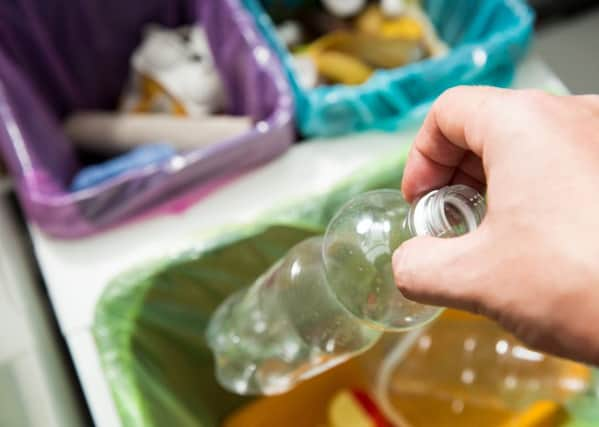Missed opportunity as Scotland wastes £11m on '˜rubbish' recycling


Dumping plastic food packaging and bottles costs Scotland an estimated £11 million a year.
Figures from Zero Waste Scotland, which works to cut waste and promote a circular economy, show each Scottish household throws away an average of 27kg of food and drink plastic annually that could have been recycled.
Advertisement
Hide AdAdvertisement
Hide AdThe rubbish could be worth £5.7m if disposed of in the proper recycling bins. Instead it is sent to landfill, leaving local authorities with a bill of around £5.3m. This adds up to a total of £11m.
Scottish households throw away around 120,000 tonnes of plastic packaging annually, while more than 20 million plastic bottles end up as litter.
This rubbish represents a missed opportunity, according to the organisation.
Iain Gulland, chief executive of Zero Waste Scotland, said: “Plastic is a valuable resource, and one which can help generate additional income when recycled properly.
“Yet we are throwing it away, adding to pollution in Scotland and wasting public money that could have been invested in schools, parks or local facilities.
“There’s an enormous opportunity to turn single-use plastic bottles into a valuable resource if placed in the correct recycling bins.”
International data reveals nearly a third of plastic packaging used around the world escapes collection systems, ending up littering streets, blocking drains and polluting the environment.
Estimates suggest up to 12 million tonnes of plastic enters global oceans each year.
Advertisement
Hide AdAdvertisement
Hide AdPlastics take centuries to break down, and synthetic items such as carrier bags, straws, fishing gear and pellets used in manufacturing, known as nurdles, have been shown to harm marine life.
It is thought around a million seabirds, 100,000 marine animals and countless fish die every years from eating or becoming entangled in plastic.
Recent beach clean-ups by the Marine Conservation Society found 83 ‘on the go’ items – including coffee cups, stirrers, cutlery, foil wrappers, straws, sandwich packets and lolly sticks – strewn across every 100m of shoreline surveyed in Scotland.
Mr Gulland added: “We have come so far with our recycling capabilities, so when it’s not possible to reduce or reuse plastic we ask everyone to put their used plastic bottles and food packing into the relevant recycling bin where they can.
“This simple step not only saves the environment, it saves council tax funds and generates money for your local authority area.”
The Scottish Government has banned the sale and manufacture of plastic-stemmed cotton buds north of the border and committed to phasing out the use of non-recyclable plastics by 2030.
A deposit-return system for plastic bottles and cans is also in the pipeline, while disposable plastic cups have been outlawed in all main government offices from this week.
Ministers say they are “determined to lead by example” in the fight to combat plastic pollution.